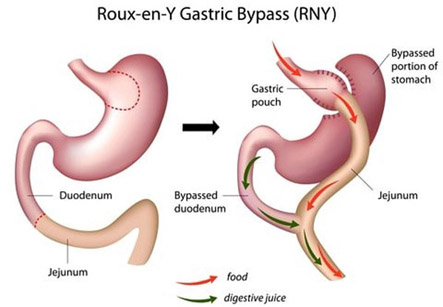Gastric Bypass Surgery
Introduction
Gastric bypass surgery is essentially a weight loss operation that attempts to make the stomach smaller so that it can hold less food, and typically prescribed for severely obese individuals. Normally, the stomach digests the food and passes it on to the tube like intestines, helping to absorb calories and nutrients from the food. Obesity affects millions of people worldwide and it is often the root cause of other diseases like heart disease, diabetes, joint and bone diseases and even cancer.
The smaller size of the stomach ensures a rapid feeling of fullness after small meals and it prevents overeating to some extent. Additionally, the operation also bypasses part of the intestines that allows for a decreased absorption of nutrients from food and ultimately leads to weight loss.
We have all the information you need about public and private clinics and hospitals that provide weight loss surgeries in Iran, Islamic Republic Of with the best quality and lowest possible prices

Gastric Bypass Surgery Procedure
One common type of gastric bypass surgery is called Roux-en-Y gastric bypass, done under general anesthesia wherein the patient is rendered unconscious during the operation.
Initially for one month after the operation the patient will be advised to take only liquid or soft foods…
There are two approaches. The surgeon might make a large cut in the belly to approach the operative site or make small incisions and perform the operation under guidance of a small camera at the tip of one of the thin instruments. The second method is called the laparoscopic approach.
During the operation the bariatric surgeon takes a small egg size part of the stomach and creates a new stomach. Thereafter, this new small stomach is attached directly to the mid portion of the intestine bypassing a significant portion of the stomach and initial part of the intestine.
Recuperation and post operative complications
There may be some pain in the operative site that may be relieved with pain killers. Heavy exercise, lifting weights or bending over are not advised in the initial few weeks after the operation.
Some complications may include bleeding or leakage of the stomach’s contents into the abdominal cavity. This latter condition can lead to a life threatening infection called peritonitis. Additionally, gastric bypass surgery may potentially increase the risk of getting gallbladder stones or blood clots that may clog blood vessels in the brain or lungs leading to life threatening complications, so it is vital for the patient to speak openly with the bariatric surgeon before treatment.
Some patients may also experience some diarrhea and nausea right after surgery, and in the long term there may be malnourishment or deficiency of vitamins and nutrients due to the operation. This can be corrected by taking appropriate vitamins and other supplements. Initially, for the first month after the operation the patient will be advised to take only liquid or soft foods that can be handled by the new smaller stomach, until the wounds of the surgery are fully healed.
Very slowly, solid foods can be introduced on the diet, but the patient is advised to chew food well and stop when they feel full, as over eating may lead to nausea or even vomiting. Another important consideration is that by continuing to overeat this will stretch the new stomach pouch and the benefits of the operation will disappear.
Drinking high calorie liquids like sodas and sweetened beverages will also negate the usefulness of the operation and the patient will not lose weight as expected after the surgery.
Gastric bypass surgery is not a procedure that removes fat and it is not a cosmetic procedure. Any patient who has been prescribed this operation needs to be counseled professionally before hand on the extent of body weight loss that is possible after this type of bariatric surgery.